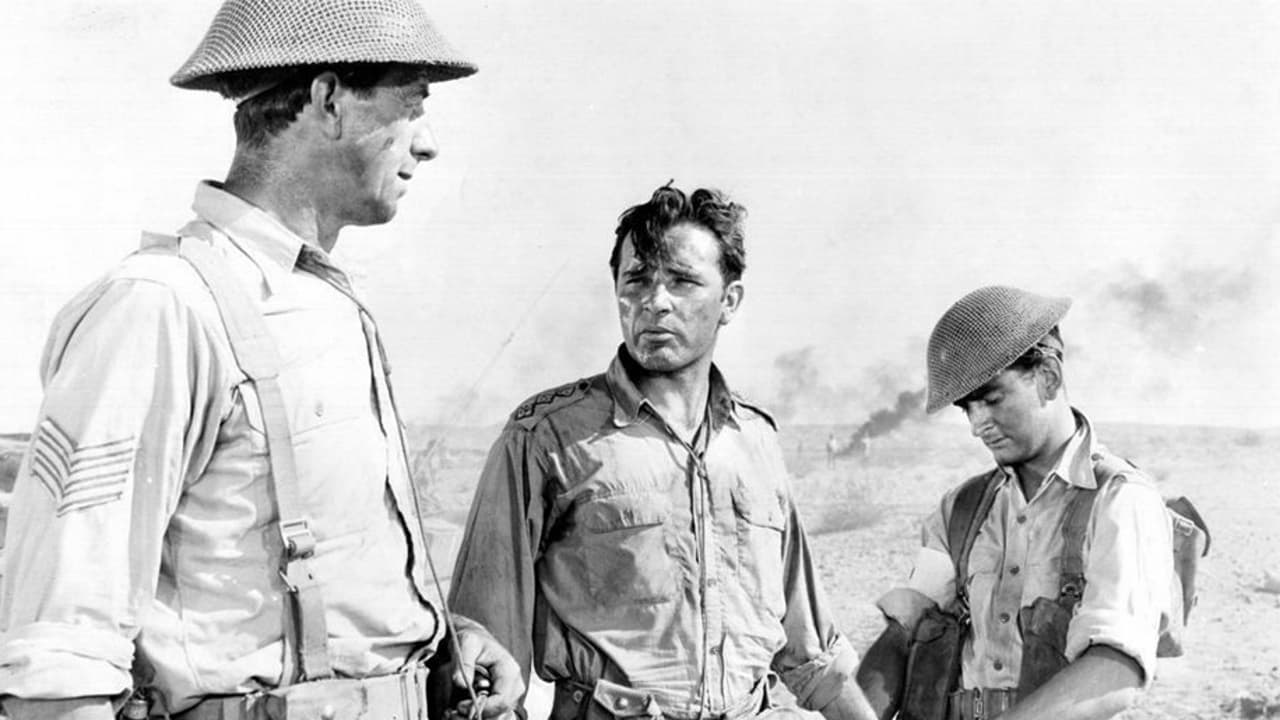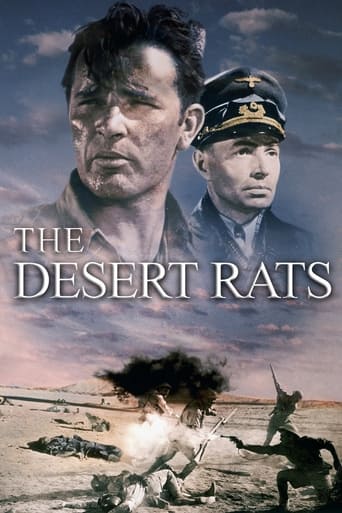GamerTab
That was an excellent one.
Aedonerre
I gave this film a 9 out of 10, because it was exactly what I expected it to be.
Edwin
The storyline feels a little thin and moth-eaten in parts but this sequel is plenty of fun.
Fleur
Actress is magnificent and exudes a hypnotic screen presence in this affecting drama.
edwagreen
Richard Burton was excellent as the hard-nosed Captain in the English army working along with a platoon of Australians in this 1953 film. Tobruk is the epicenter here as the English fought bravely there in an attempt to cut off the Germans from taking control of Egypt and shutting off the oil via the Suez Canal.He is equally matched by Robert Newton, a former schoolmaster taken to drink and a coward as well. The Burton character takes him under his wing and heeds his advice not to bring a fellow soldier up on charges for insubordination when the latter went on to save lives.In one raid Burton is captured by the Germans and gets to meet Field Marshal Rommel, always well played by James Mason. Was that Mason speaking German at the beginning? During Burton's capture, Mason suddenly speaks English. Burton's escape and return to his men was rushed through and the ending of successfully holding off the Germans at Tobruk was also hurried.
Leofwine_draca
THE DESERT RATS is something of a follow-up to THE DESERT FOX, which also starred James Mason as Erwin Rommel and covered some of the North African campaign. However the emphasis of this film is very much on the Allied forces, particularly an Australian platoon who baulk at their new captain, the Scottish Tammy MacRoberts.First off, the title is a misnomer; this isn't about the 'desert rats' but rather about the siege of Tobruk and the dedicated men who fought back against the encircling Nazi siege. Richard Burton is well cast as the heroic leader of men and brings the kind of gravitas to the part that only he can deliver. The desert-set action is quite familiar from other war films (and there are a LOT of desert-themed war films in existence) but what makes this one work is a fast pace and some good supporting cast members.Mason doesn't have a big role to play in this film although he does get to share a strong scene with Burton. The other soldiers are played by Robert Newton, the delightful Chips Rafferty, movie villain Torin Thatcher, and Charles Tingwell. The story runs the usual gamut of heroism and capture, escape and death, and builds to a suspenseful against-the-odds climax. It's certainly not one of the finest war films in existence but as war films go it's a solid enough effort.
Steffi_P
In the decade following the close of World War 2, there seems to have been a need to document on film every significant allied operation (at least, every successful one), to give every hero a movie they could identify with. A worthy aim, but the sheer volume of these pictures meant there was a vast variety in quality and approach.This one was produced at Fox and directed by Robert Wise, who had only recently joined the studio after having cut his teeth in the RKO B-unit. During the 40s RKO was making literally the darkest pictures in Hollywood, and much of that shadowy style seems to have rubbed off on Wise. He and cinematographer Lucien Ballard (who certainly knew a thing or two about shadows, having taken his earliest assignments alongside Josef von Sternberg) have created a war picture which is not exactly noirish in story, but is certainly full noir in looks. The gloomy, undefined edges of the interiors give a feeling of entrapment suitable to the situation of the beleaguered troops.There is little opportunity for darkness in a desert, but the outdoor scenes also carry on that feel of confinement. The landscape is often obscured by smoke or sandstorms. We see silhouettes that could be friend or foe, and glimpse enemies through gun sights. There are few clear shots of the action, more often just mid-shots of the soldiers which make it hard to tell their position in relation to the combat. The impression we get is – quite accurately – that in the heat of battle the ordinary foot soldiers can rarely tell exactly what is going on, whether they are winning or losing, or how to proceed beyond the execution of the latest order. It was things like this – a bit of lateral thinking to give us a feeling for the protagonist's plight – that Robert Wise was really good at.The post-war period had seen the rise of the UK film industry, and unsurprisingly the best British stars were being poached for Hollywood productions. So here we have Richard Burton, at his most inappropriately theatrical and unshakeably serious (how often have you seen Burton smile?), and yet somehow he is very enjoyable to watch. James Mason had gone in a few short years from dashing male leads to slightly sinister middle-aged types, but he could pull it off, and perhaps even enjoyed villainous roles like this a bit. Speaking of enjoying villainous roles, what have we here? Robert Newton, playing – of all things – an alcoholic ex-schoolteacher. He always showed some potential in his straight roles, but to be honest he is just a bit boring without snarling and eye-rolling.The original music is by ex-Disney intern Leigh Harline (he wrote When You Wish upon a Star, you know). Actually there isn't very much original music to be heard in the Desert Rats, the score being mostly snippets of Waltzing Matilda, but there is one interesting point about the music. Take a closer look at that opening credits sequence. At one point, you see a soldier with a trumpet pick up the tune. This kind of makes sense – sounding the charge and all that. Then, a shot or two later, a soldier dives into a shell hole and pops back up… playing a clarinet! What is going on there? I actually whizzed the tape back and forth a few times to check if any more of the orchestra appears, but sadly they don't. I would have liked to see Richard Burton come on at the end, playing a trombone.Anyway, enough of that. It's odd in a way that Hollywood put such a lot of energy into honouring the heroes of the recent combat, because by and large the veterans themselves stayed away from these pictures. The target audience was more often the younger generation who hadn't been old enough to fight at the time. Grim authenticity was becoming less of a priority (and while the Desert Rats is certainly gritty and respectful it does once or twice strain credibility and historical accuracy), and the anti-war mood had not yet caught on (although this picture is certainly far less gung-ho than was the norm a few years earlier). The most a war picture really needed to be at this point was entertaining, and the Desert Rats is victorious on this front. It is neither deep nor spectacular, but it is a good and easy watch for your eighty-five minutes.
gmhpompey
Desert Rats is a 'good old stiff upper lip' yarn with angry young man, Richard Burton, putting in a blinder. The film is set in WW2, North Africa and Rommel has swept across North Africa. The film is about Tobruk and how the German Army were held back. Burton leads ANZAC troops through the trenches of warfare. Good fighters those ANZAC's it appears and the film is a real tribute to them. This is reinforced by the movie being in black and white and quite informative. The action is OK and I especially liked the black outfit Richard Burton dons for that gritty commando raid. There is also a top encounter between Burton and James Mason - Pacino and De Niro in Heat - but with Burton's angry young man act.I would recommend it if only for Richard Burton.

